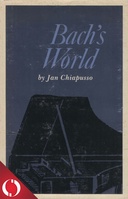Explore

The author achieves a dual purpose in this volume: "To portray the mind of the master, his peculiarly anachronistic culture in an epoch of change," and "to trace Bach's application of venerable philosophies—musical as well as theological—to a musical equipment technically so much in advance of his time." Mr. Chiapusso accordingly explores Bach's Lutheran education, the philosophers and writers available to him, and the influence of scientific thought on his faith and work. He finds that at the dawn of the Enlightenment, when traditional culture was giving way to new ideas, Bach retained an essentially medieval world view, exercising his art "for the glory of God." An understanding of this world view is essential, Mr. Chiapusso demonstrates, to the full appreciation of Bach's music, its spiritual foundations, and its impressive technical innovations. In this context the author goes on to examine such problems as Bach's attitude toward instrumentation, his ornamentation, his use of symbolism, his use of secular music in the church, and his borrowing of ecclesiastical music for secular purposes. A valuable addition to the history of music and ideas.
This book is included in DOAB.
Why read this book? Have your say.
You must be logged in to comment.
Rights Information
Are you the author or publisher of this work? If so, you can claim it as yours by registering as an Unglue.it rights holder.Downloads
This work has been downloaded 37 times via unglue.it ebook links.
- 37 - epub (CC BY-NC-ND) at Unglue.it.
Keywords
- Art music, orchestral & formal music
- classical"
- Music
- Music: styles & genres
- The arts
- thema EDItEUR::A The Arts::AV Music::AVL Music: styles and genres::AVLA Art music, orchestral and formal music
- Western "
Editions

